Multilateral Negotiation Essay: USA's Role and Conference Prep
VerifiedAdded on 2022/11/18
|8
|2097
|314
Essay
AI Summary
This essay provides a comprehensive analysis of multilateral negotiation, defining it as the involvement of multiple parties in discussions to reach a consensus on various issues, crucial in international diplomacy and the formation of organizations like the UN. It highlights the complexities of the process, including bargaining, information processing, pre-negotiation phases, and the impact of participant differentiation. The essay then examines the USA's approach to multilateral negotiation, particularly during Barack Obama's presidency, noting its preference for bilateral negotiations and the influence of personal characteristics. It also explores the art of preparing for multilateral conferences, emphasizing the importance of defining goals, assessing participant interests, and creating a suitable environment for negotiation, highlighting that the conference should be a repetitive game to achieve the goal with frequent conference on pre-set of agendas and problems. The essay concludes by underscoring the significance of effective negotiation in fostering international relations and trade, emphasizing the need for trust and a systematic approach for successful outcomes.
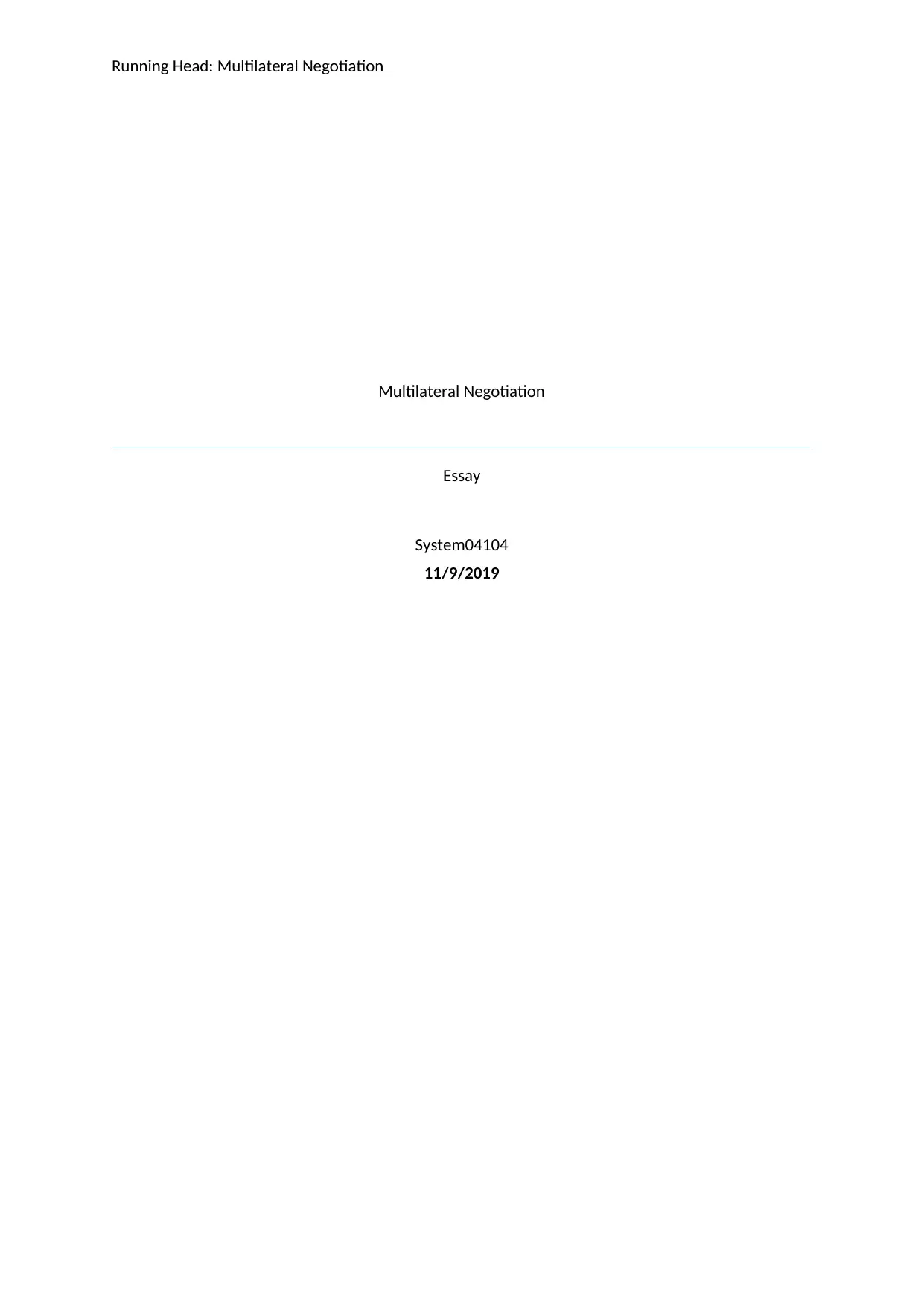
Running Head: Multilateral Negotiation
Multilateral Negotiation
Essay
System04104
11/9/2019
Multilateral Negotiation
Essay
System04104
11/9/2019
Paraphrase This Document
Need a fresh take? Get an instant paraphrase of this document with our AI Paraphraser
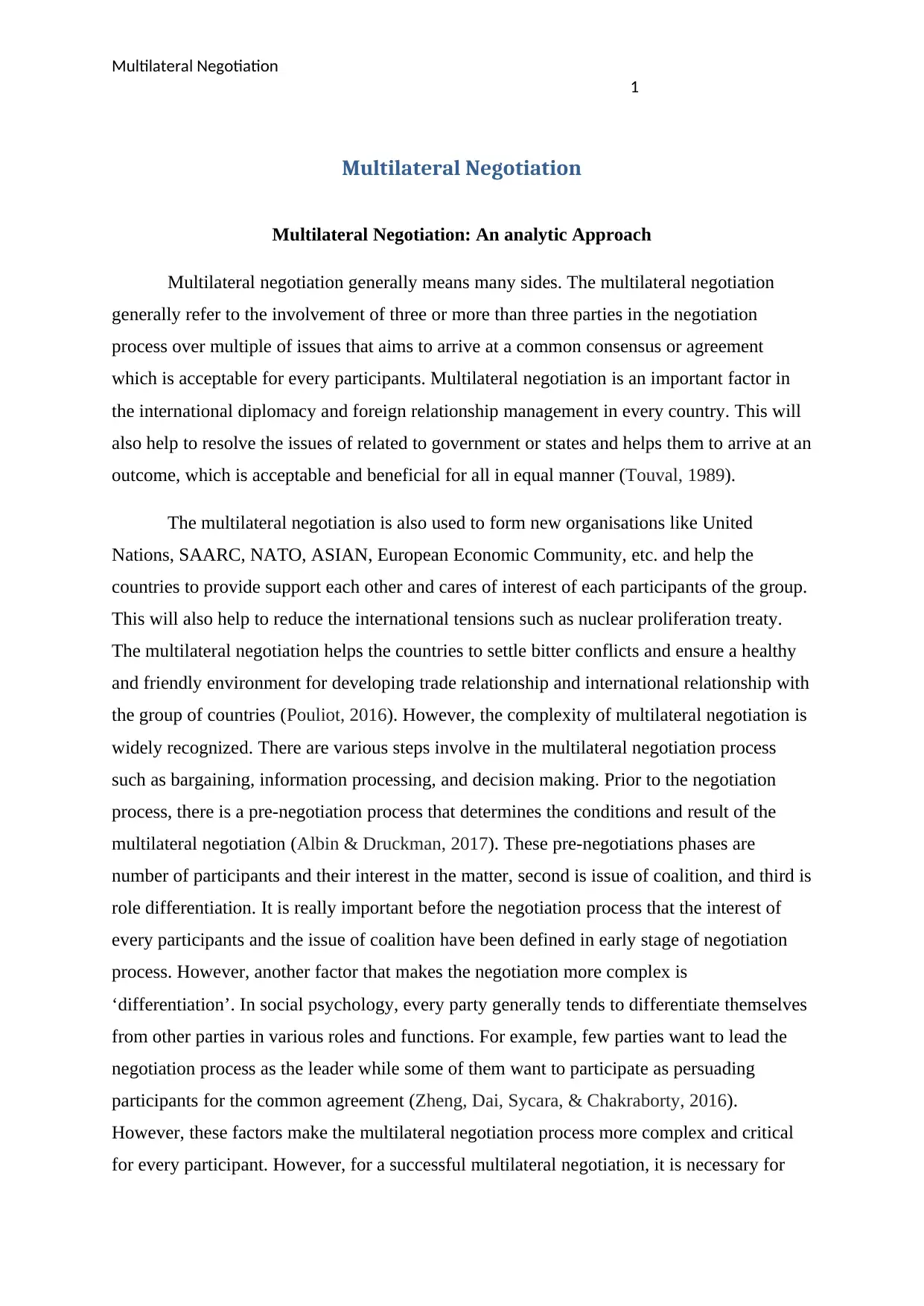
Multilateral Negotiation
1
Multilateral Negotiation
Multilateral Negotiation: An analytic Approach
Multilateral negotiation generally means many sides. The multilateral negotiation
generally refer to the involvement of three or more than three parties in the negotiation
process over multiple of issues that aims to arrive at a common consensus or agreement
which is acceptable for every participants. Multilateral negotiation is an important factor in
the international diplomacy and foreign relationship management in every country. This will
also help to resolve the issues of related to government or states and helps them to arrive at an
outcome, which is acceptable and beneficial for all in equal manner (Touval, 1989).
The multilateral negotiation is also used to form new organisations like United
Nations, SAARC, NATO, ASIAN, European Economic Community, etc. and help the
countries to provide support each other and cares of interest of each participants of the group.
This will also help to reduce the international tensions such as nuclear proliferation treaty.
The multilateral negotiation helps the countries to settle bitter conflicts and ensure a healthy
and friendly environment for developing trade relationship and international relationship with
the group of countries (Pouliot, 2016). However, the complexity of multilateral negotiation is
widely recognized. There are various steps involve in the multilateral negotiation process
such as bargaining, information processing, and decision making. Prior to the negotiation
process, there is a pre-negotiation process that determines the conditions and result of the
multilateral negotiation (Albin & Druckman, 2017). These pre-negotiations phases are
number of participants and their interest in the matter, second is issue of coalition, and third is
role differentiation. It is really important before the negotiation process that the interest of
every participants and the issue of coalition have been defined in early stage of negotiation
process. However, another factor that makes the negotiation more complex is
‘differentiation’. In social psychology, every party generally tends to differentiate themselves
from other parties in various roles and functions. For example, few parties want to lead the
negotiation process as the leader while some of them want to participate as persuading
participants for the common agreement (Zheng, Dai, Sycara, & Chakraborty, 2016).
However, these factors make the multilateral negotiation process more complex and critical
for every participant. However, for a successful multilateral negotiation, it is necessary for
1
Multilateral Negotiation
Multilateral Negotiation: An analytic Approach
Multilateral negotiation generally means many sides. The multilateral negotiation
generally refer to the involvement of three or more than three parties in the negotiation
process over multiple of issues that aims to arrive at a common consensus or agreement
which is acceptable for every participants. Multilateral negotiation is an important factor in
the international diplomacy and foreign relationship management in every country. This will
also help to resolve the issues of related to government or states and helps them to arrive at an
outcome, which is acceptable and beneficial for all in equal manner (Touval, 1989).
The multilateral negotiation is also used to form new organisations like United
Nations, SAARC, NATO, ASIAN, European Economic Community, etc. and help the
countries to provide support each other and cares of interest of each participants of the group.
This will also help to reduce the international tensions such as nuclear proliferation treaty.
The multilateral negotiation helps the countries to settle bitter conflicts and ensure a healthy
and friendly environment for developing trade relationship and international relationship with
the group of countries (Pouliot, 2016). However, the complexity of multilateral negotiation is
widely recognized. There are various steps involve in the multilateral negotiation process
such as bargaining, information processing, and decision making. Prior to the negotiation
process, there is a pre-negotiation process that determines the conditions and result of the
multilateral negotiation (Albin & Druckman, 2017). These pre-negotiations phases are
number of participants and their interest in the matter, second is issue of coalition, and third is
role differentiation. It is really important before the negotiation process that the interest of
every participants and the issue of coalition have been defined in early stage of negotiation
process. However, another factor that makes the negotiation more complex is
‘differentiation’. In social psychology, every party generally tends to differentiate themselves
from other parties in various roles and functions. For example, few parties want to lead the
negotiation process as the leader while some of them want to participate as persuading
participants for the common agreement (Zheng, Dai, Sycara, & Chakraborty, 2016).
However, these factors make the multilateral negotiation process more complex and critical
for every participant. However, for a successful multilateral negotiation, it is necessary for
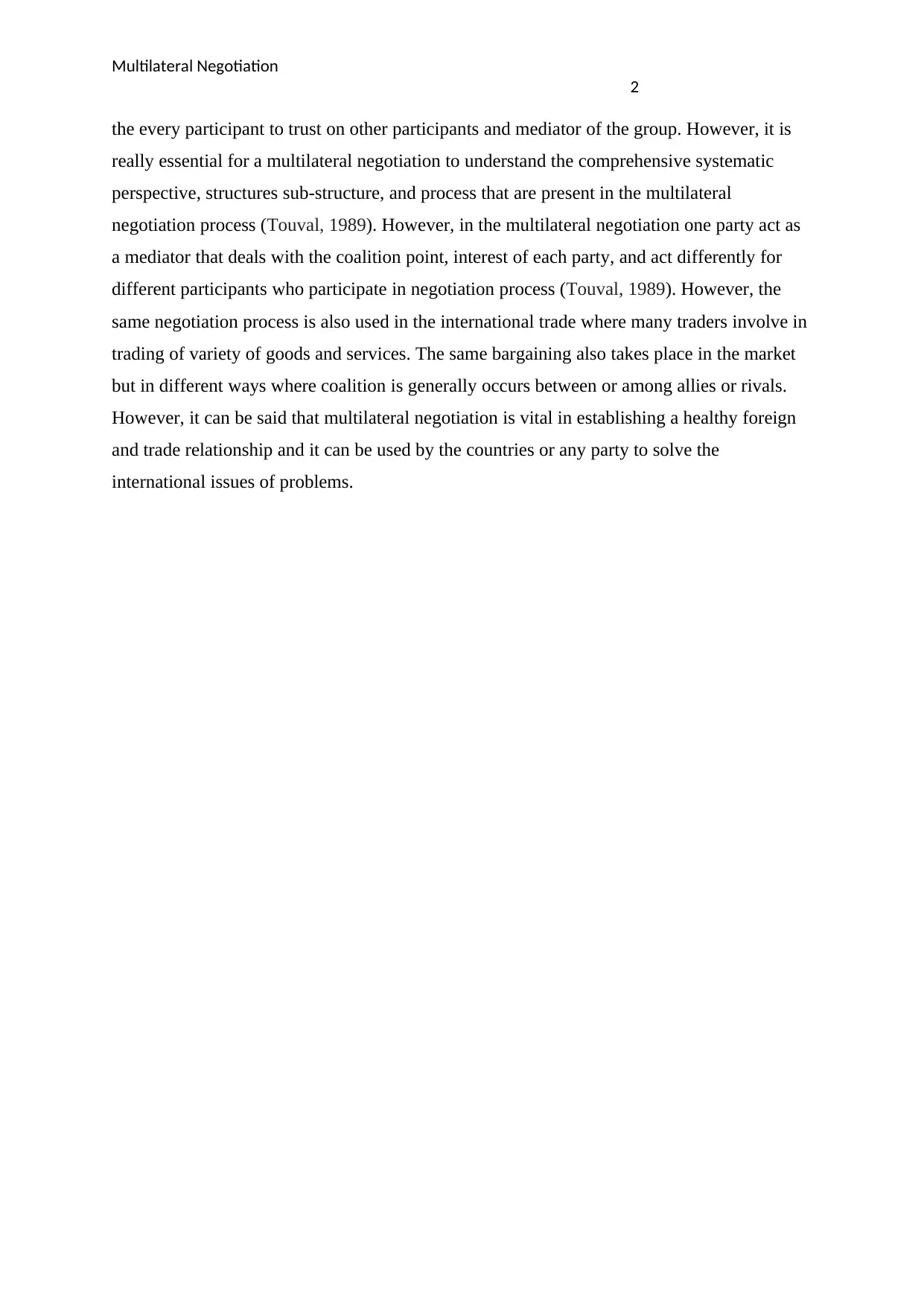
Multilateral Negotiation
2
the every participant to trust on other participants and mediator of the group. However, it is
really essential for a multilateral negotiation to understand the comprehensive systematic
perspective, structures sub-structure, and process that are present in the multilateral
negotiation process (Touval, 1989). However, in the multilateral negotiation one party act as
a mediator that deals with the coalition point, interest of each party, and act differently for
different participants who participate in negotiation process (Touval, 1989). However, the
same negotiation process is also used in the international trade where many traders involve in
trading of variety of goods and services. The same bargaining also takes place in the market
but in different ways where coalition is generally occurs between or among allies or rivals.
However, it can be said that multilateral negotiation is vital in establishing a healthy foreign
and trade relationship and it can be used by the countries or any party to solve the
international issues of problems.
2
the every participant to trust on other participants and mediator of the group. However, it is
really essential for a multilateral negotiation to understand the comprehensive systematic
perspective, structures sub-structure, and process that are present in the multilateral
negotiation process (Touval, 1989). However, in the multilateral negotiation one party act as
a mediator that deals with the coalition point, interest of each party, and act differently for
different participants who participate in negotiation process (Touval, 1989). However, the
same negotiation process is also used in the international trade where many traders involve in
trading of variety of goods and services. The same bargaining also takes place in the market
but in different ways where coalition is generally occurs between or among allies or rivals.
However, it can be said that multilateral negotiation is vital in establishing a healthy foreign
and trade relationship and it can be used by the countries or any party to solve the
international issues of problems.
⊘ This is a preview!⊘
Do you want full access?
Subscribe today to unlock all pages.

Trusted by 1+ million students worldwide
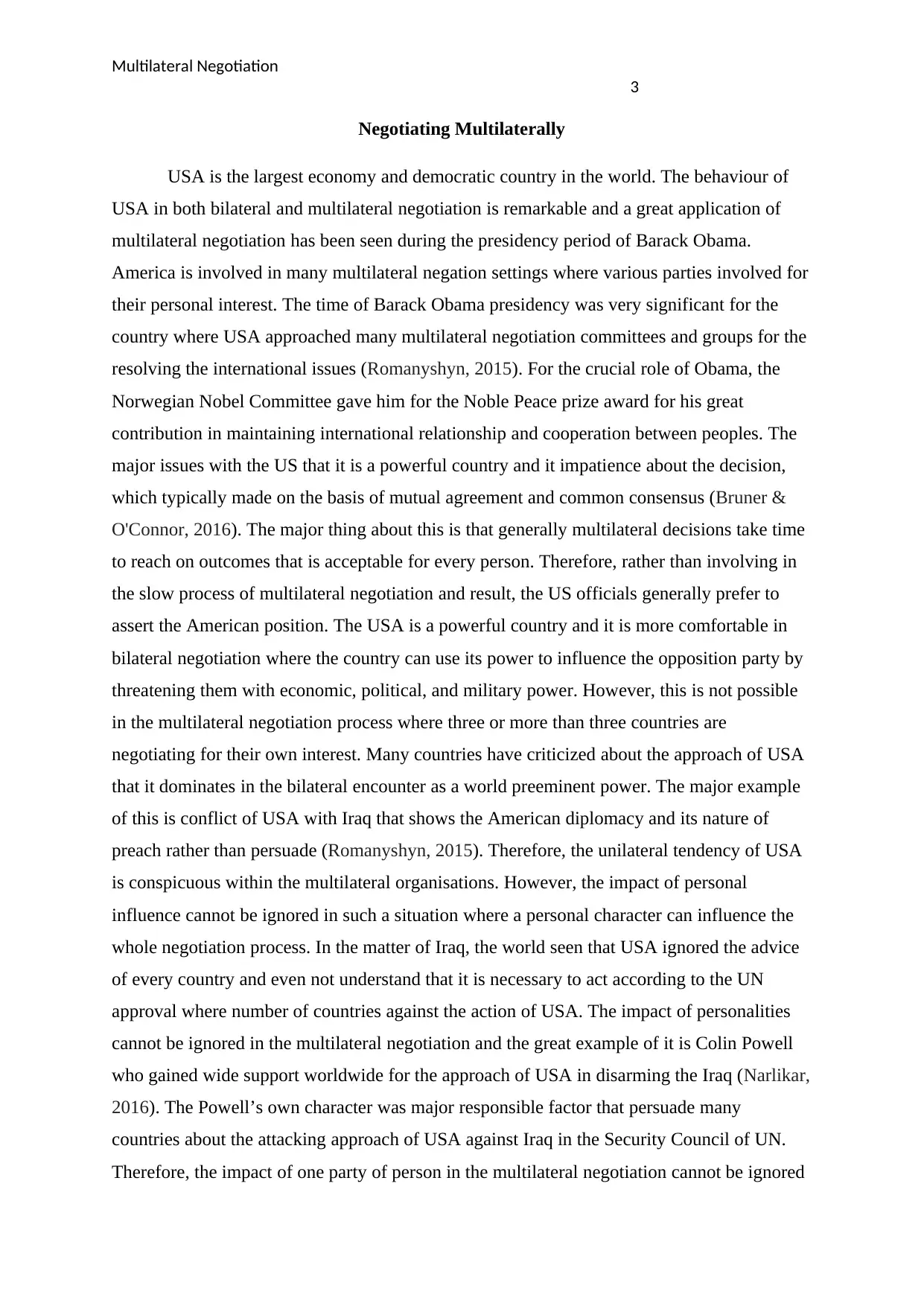
Multilateral Negotiation
3
Negotiating Multilaterally
USA is the largest economy and democratic country in the world. The behaviour of
USA in both bilateral and multilateral negotiation is remarkable and a great application of
multilateral negotiation has been seen during the presidency period of Barack Obama.
America is involved in many multilateral negation settings where various parties involved for
their personal interest. The time of Barack Obama presidency was very significant for the
country where USA approached many multilateral negotiation committees and groups for the
resolving the international issues (Romanyshyn, 2015). For the crucial role of Obama, the
Norwegian Nobel Committee gave him for the Noble Peace prize award for his great
contribution in maintaining international relationship and cooperation between peoples. The
major issues with the US that it is a powerful country and it impatience about the decision,
which typically made on the basis of mutual agreement and common consensus (Bruner &
O'Connor, 2016). The major thing about this is that generally multilateral decisions take time
to reach on outcomes that is acceptable for every person. Therefore, rather than involving in
the slow process of multilateral negotiation and result, the US officials generally prefer to
assert the American position. The USA is a powerful country and it is more comfortable in
bilateral negotiation where the country can use its power to influence the opposition party by
threatening them with economic, political, and military power. However, this is not possible
in the multilateral negotiation process where three or more than three countries are
negotiating for their own interest. Many countries have criticized about the approach of USA
that it dominates in the bilateral encounter as a world preeminent power. The major example
of this is conflict of USA with Iraq that shows the American diplomacy and its nature of
preach rather than persuade (Romanyshyn, 2015). Therefore, the unilateral tendency of USA
is conspicuous within the multilateral organisations. However, the impact of personal
influence cannot be ignored in such a situation where a personal character can influence the
whole negotiation process. In the matter of Iraq, the world seen that USA ignored the advice
of every country and even not understand that it is necessary to act according to the UN
approval where number of countries against the action of USA. The impact of personalities
cannot be ignored in the multilateral negotiation and the great example of it is Colin Powell
who gained wide support worldwide for the approach of USA in disarming the Iraq (Narlikar,
2016). The Powell’s own character was major responsible factor that persuade many
countries about the attacking approach of USA against Iraq in the Security Council of UN.
Therefore, the impact of one party of person in the multilateral negotiation cannot be ignored
3
Negotiating Multilaterally
USA is the largest economy and democratic country in the world. The behaviour of
USA in both bilateral and multilateral negotiation is remarkable and a great application of
multilateral negotiation has been seen during the presidency period of Barack Obama.
America is involved in many multilateral negation settings where various parties involved for
their personal interest. The time of Barack Obama presidency was very significant for the
country where USA approached many multilateral negotiation committees and groups for the
resolving the international issues (Romanyshyn, 2015). For the crucial role of Obama, the
Norwegian Nobel Committee gave him for the Noble Peace prize award for his great
contribution in maintaining international relationship and cooperation between peoples. The
major issues with the US that it is a powerful country and it impatience about the decision,
which typically made on the basis of mutual agreement and common consensus (Bruner &
O'Connor, 2016). The major thing about this is that generally multilateral decisions take time
to reach on outcomes that is acceptable for every person. Therefore, rather than involving in
the slow process of multilateral negotiation and result, the US officials generally prefer to
assert the American position. The USA is a powerful country and it is more comfortable in
bilateral negotiation where the country can use its power to influence the opposition party by
threatening them with economic, political, and military power. However, this is not possible
in the multilateral negotiation process where three or more than three countries are
negotiating for their own interest. Many countries have criticized about the approach of USA
that it dominates in the bilateral encounter as a world preeminent power. The major example
of this is conflict of USA with Iraq that shows the American diplomacy and its nature of
preach rather than persuade (Romanyshyn, 2015). Therefore, the unilateral tendency of USA
is conspicuous within the multilateral organisations. However, the impact of personal
influence cannot be ignored in such a situation where a personal character can influence the
whole negotiation process. In the matter of Iraq, the world seen that USA ignored the advice
of every country and even not understand that it is necessary to act according to the UN
approval where number of countries against the action of USA. The impact of personalities
cannot be ignored in the multilateral negotiation and the great example of it is Colin Powell
who gained wide support worldwide for the approach of USA in disarming the Iraq (Narlikar,
2016). The Powell’s own character was major responsible factor that persuade many
countries about the attacking approach of USA against Iraq in the Security Council of UN.
Therefore, the impact of one party of person in the multilateral negotiation cannot be ignored
Paraphrase This Document
Need a fresh take? Get an instant paraphrase of this document with our AI Paraphraser
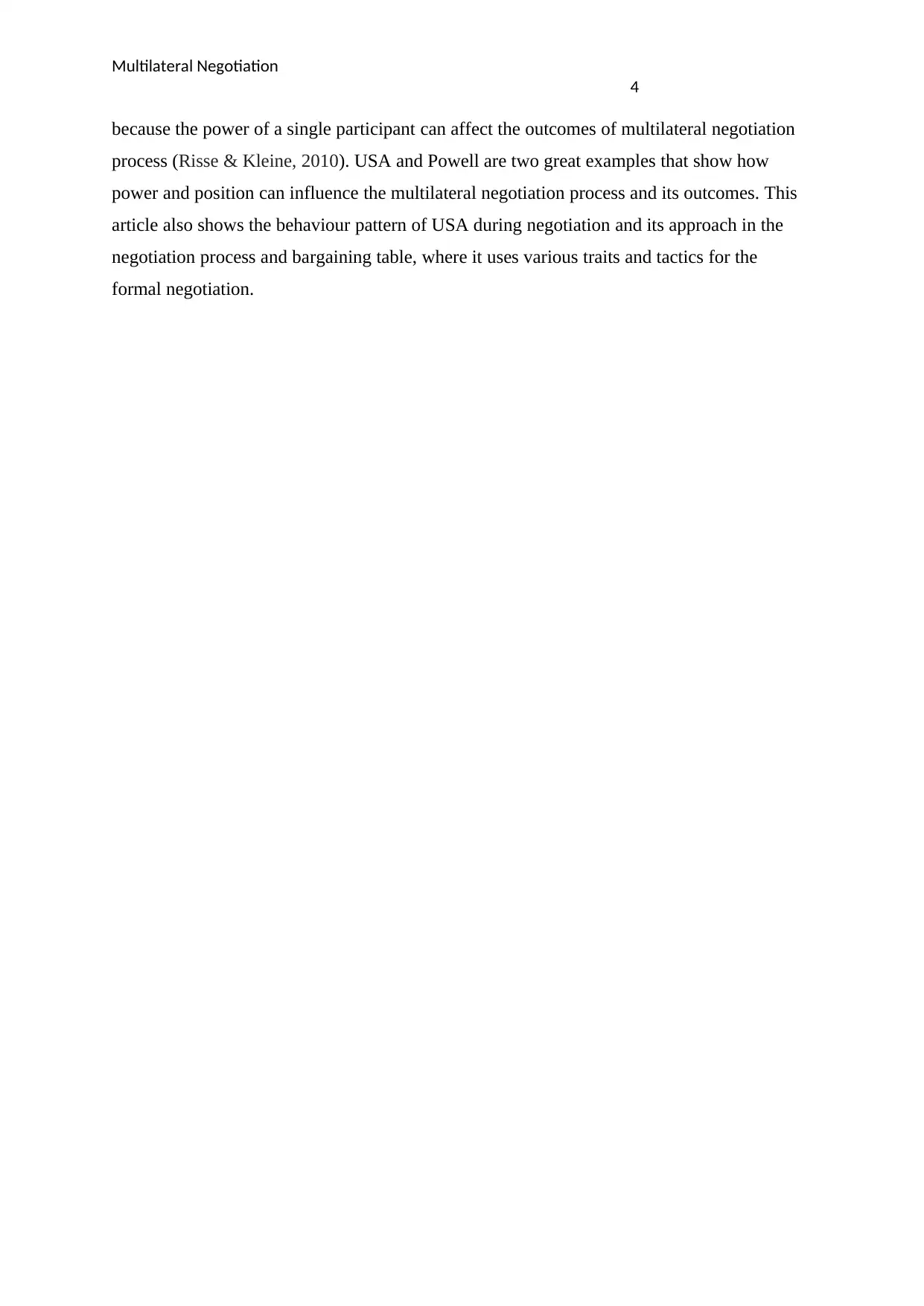
Multilateral Negotiation
4
because the power of a single participant can affect the outcomes of multilateral negotiation
process (Risse & Kleine, 2010). USA and Powell are two great examples that show how
power and position can influence the multilateral negotiation process and its outcomes. This
article also shows the behaviour pattern of USA during negotiation and its approach in the
negotiation process and bargaining table, where it uses various traits and tactics for the
formal negotiation.
4
because the power of a single participant can affect the outcomes of multilateral negotiation
process (Risse & Kleine, 2010). USA and Powell are two great examples that show how
power and position can influence the multilateral negotiation process and its outcomes. This
article also shows the behaviour pattern of USA during negotiation and its approach in the
negotiation process and bargaining table, where it uses various traits and tactics for the
formal negotiation.
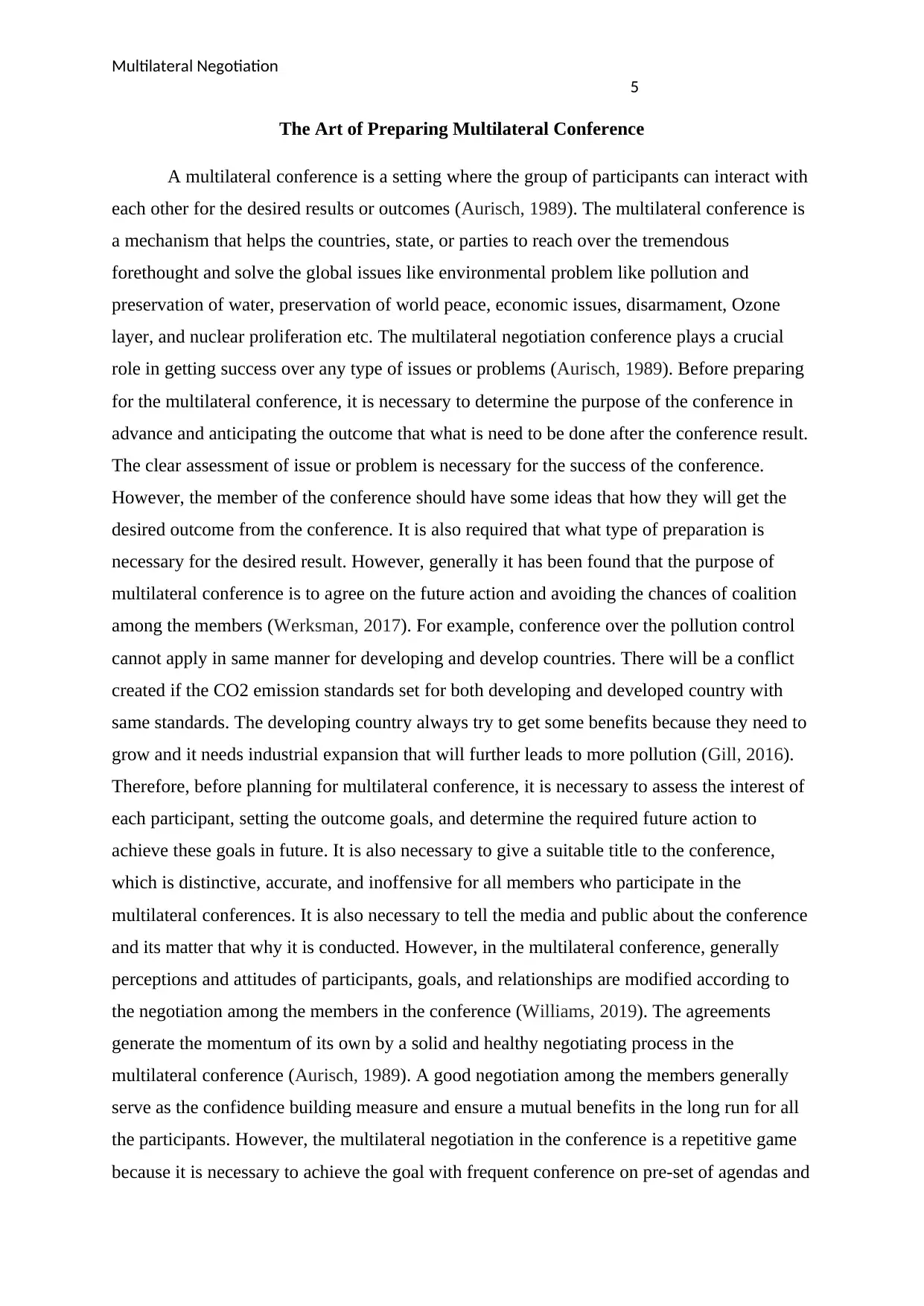
Multilateral Negotiation
5
The Art of Preparing Multilateral Conference
A multilateral conference is a setting where the group of participants can interact with
each other for the desired results or outcomes (Aurisch, 1989). The multilateral conference is
a mechanism that helps the countries, state, or parties to reach over the tremendous
forethought and solve the global issues like environmental problem like pollution and
preservation of water, preservation of world peace, economic issues, disarmament, Ozone
layer, and nuclear proliferation etc. The multilateral negotiation conference plays a crucial
role in getting success over any type of issues or problems (Aurisch, 1989). Before preparing
for the multilateral conference, it is necessary to determine the purpose of the conference in
advance and anticipating the outcome that what is need to be done after the conference result.
The clear assessment of issue or problem is necessary for the success of the conference.
However, the member of the conference should have some ideas that how they will get the
desired outcome from the conference. It is also required that what type of preparation is
necessary for the desired result. However, generally it has been found that the purpose of
multilateral conference is to agree on the future action and avoiding the chances of coalition
among the members (Werksman, 2017). For example, conference over the pollution control
cannot apply in same manner for developing and develop countries. There will be a conflict
created if the CO2 emission standards set for both developing and developed country with
same standards. The developing country always try to get some benefits because they need to
grow and it needs industrial expansion that will further leads to more pollution (Gill, 2016).
Therefore, before planning for multilateral conference, it is necessary to assess the interest of
each participant, setting the outcome goals, and determine the required future action to
achieve these goals in future. It is also necessary to give a suitable title to the conference,
which is distinctive, accurate, and inoffensive for all members who participate in the
multilateral conferences. It is also necessary to tell the media and public about the conference
and its matter that why it is conducted. However, in the multilateral conference, generally
perceptions and attitudes of participants, goals, and relationships are modified according to
the negotiation among the members in the conference (Williams, 2019). The agreements
generate the momentum of its own by a solid and healthy negotiating process in the
multilateral conference (Aurisch, 1989). A good negotiation among the members generally
serve as the confidence building measure and ensure a mutual benefits in the long run for all
the participants. However, the multilateral negotiation in the conference is a repetitive game
because it is necessary to achieve the goal with frequent conference on pre-set of agendas and
5
The Art of Preparing Multilateral Conference
A multilateral conference is a setting where the group of participants can interact with
each other for the desired results or outcomes (Aurisch, 1989). The multilateral conference is
a mechanism that helps the countries, state, or parties to reach over the tremendous
forethought and solve the global issues like environmental problem like pollution and
preservation of water, preservation of world peace, economic issues, disarmament, Ozone
layer, and nuclear proliferation etc. The multilateral negotiation conference plays a crucial
role in getting success over any type of issues or problems (Aurisch, 1989). Before preparing
for the multilateral conference, it is necessary to determine the purpose of the conference in
advance and anticipating the outcome that what is need to be done after the conference result.
The clear assessment of issue or problem is necessary for the success of the conference.
However, the member of the conference should have some ideas that how they will get the
desired outcome from the conference. It is also required that what type of preparation is
necessary for the desired result. However, generally it has been found that the purpose of
multilateral conference is to agree on the future action and avoiding the chances of coalition
among the members (Werksman, 2017). For example, conference over the pollution control
cannot apply in same manner for developing and develop countries. There will be a conflict
created if the CO2 emission standards set for both developing and developed country with
same standards. The developing country always try to get some benefits because they need to
grow and it needs industrial expansion that will further leads to more pollution (Gill, 2016).
Therefore, before planning for multilateral conference, it is necessary to assess the interest of
each participant, setting the outcome goals, and determine the required future action to
achieve these goals in future. It is also necessary to give a suitable title to the conference,
which is distinctive, accurate, and inoffensive for all members who participate in the
multilateral conferences. It is also necessary to tell the media and public about the conference
and its matter that why it is conducted. However, in the multilateral conference, generally
perceptions and attitudes of participants, goals, and relationships are modified according to
the negotiation among the members in the conference (Williams, 2019). The agreements
generate the momentum of its own by a solid and healthy negotiating process in the
multilateral conference (Aurisch, 1989). A good negotiation among the members generally
serve as the confidence building measure and ensure a mutual benefits in the long run for all
the participants. However, the multilateral negotiation in the conference is a repetitive game
because it is necessary to achieve the goal with frequent conference on pre-set of agendas and
⊘ This is a preview!⊘
Do you want full access?
Subscribe today to unlock all pages.

Trusted by 1+ million students worldwide

Multilateral Negotiation
6
problems. However, the multilateral negotiation, which is the part of multilateral conference,
is an art that determines the steady progress and ultimate success of every participant and
derive the each participant on the bargaining table for achieving the common success for all.
6
problems. However, the multilateral negotiation, which is the part of multilateral conference,
is an art that determines the steady progress and ultimate success of every participant and
derive the each participant on the bargaining table for achieving the common success for all.
Paraphrase This Document
Need a fresh take? Get an instant paraphrase of this document with our AI Paraphraser
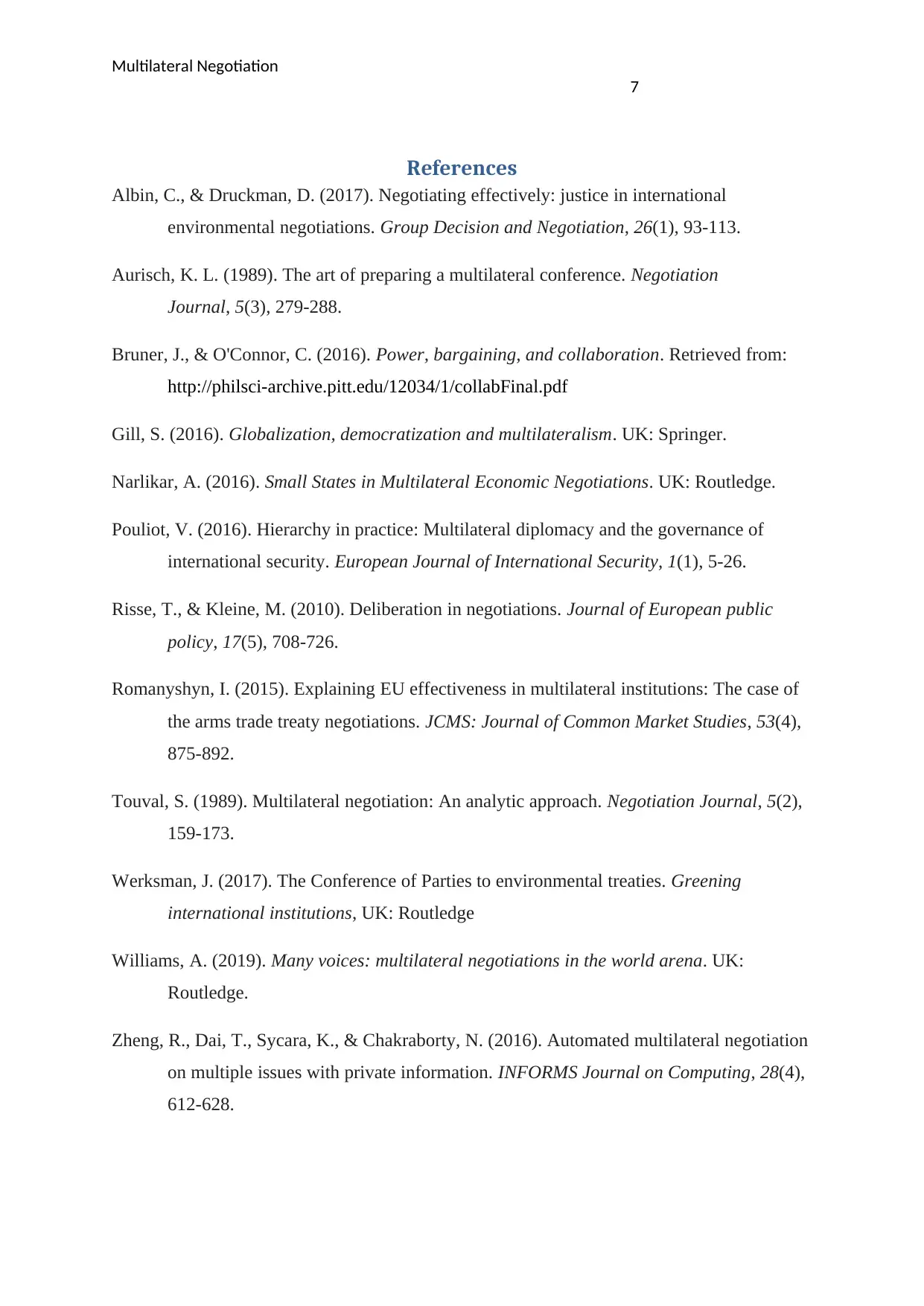
Multilateral Negotiation
7
References
Albin, C., & Druckman, D. (2017). Negotiating effectively: justice in international
environmental negotiations. Group Decision and Negotiation, 26(1), 93-113.
Aurisch, K. L. (1989). The art of preparing a multilateral conference. Negotiation
Journal, 5(3), 279-288.
Bruner, J., & O'Connor, C. (2016). Power, bargaining, and collaboration. Retrieved from:
http://philsci-archive.pitt.edu/12034/1/collabFinal.pdf
Gill, S. (2016). Globalization, democratization and multilateralism. UK: Springer.
Narlikar, A. (2016). Small States in Multilateral Economic Negotiations. UK: Routledge.
Pouliot, V. (2016). Hierarchy in practice: Multilateral diplomacy and the governance of
international security. European Journal of International Security, 1(1), 5-26.
Risse, T., & Kleine, M. (2010). Deliberation in negotiations. Journal of European public
policy, 17(5), 708-726.
Romanyshyn, I. (2015). Explaining EU effectiveness in multilateral institutions: The case of
the arms trade treaty negotiations. JCMS: Journal of Common Market Studies, 53(4),
875-892.
Touval, S. (1989). Multilateral negotiation: An analytic approach. Negotiation Journal, 5(2),
159-173.
Werksman, J. (2017). The Conference of Parties to environmental treaties. Greening
international institutions, UK: Routledge
Williams, A. (2019). Many voices: multilateral negotiations in the world arena. UK:
Routledge.
Zheng, R., Dai, T., Sycara, K., & Chakraborty, N. (2016). Automated multilateral negotiation
on multiple issues with private information. INFORMS Journal on Computing, 28(4),
612-628.
7
References
Albin, C., & Druckman, D. (2017). Negotiating effectively: justice in international
environmental negotiations. Group Decision and Negotiation, 26(1), 93-113.
Aurisch, K. L. (1989). The art of preparing a multilateral conference. Negotiation
Journal, 5(3), 279-288.
Bruner, J., & O'Connor, C. (2016). Power, bargaining, and collaboration. Retrieved from:
http://philsci-archive.pitt.edu/12034/1/collabFinal.pdf
Gill, S. (2016). Globalization, democratization and multilateralism. UK: Springer.
Narlikar, A. (2016). Small States in Multilateral Economic Negotiations. UK: Routledge.
Pouliot, V. (2016). Hierarchy in practice: Multilateral diplomacy and the governance of
international security. European Journal of International Security, 1(1), 5-26.
Risse, T., & Kleine, M. (2010). Deliberation in negotiations. Journal of European public
policy, 17(5), 708-726.
Romanyshyn, I. (2015). Explaining EU effectiveness in multilateral institutions: The case of
the arms trade treaty negotiations. JCMS: Journal of Common Market Studies, 53(4),
875-892.
Touval, S. (1989). Multilateral negotiation: An analytic approach. Negotiation Journal, 5(2),
159-173.
Werksman, J. (2017). The Conference of Parties to environmental treaties. Greening
international institutions, UK: Routledge
Williams, A. (2019). Many voices: multilateral negotiations in the world arena. UK:
Routledge.
Zheng, R., Dai, T., Sycara, K., & Chakraborty, N. (2016). Automated multilateral negotiation
on multiple issues with private information. INFORMS Journal on Computing, 28(4),
612-628.
1 out of 8
Related Documents
Your All-in-One AI-Powered Toolkit for Academic Success.
+13062052269
info@desklib.com
Available 24*7 on WhatsApp / Email
![[object Object]](/_next/static/media/star-bottom.7253800d.svg)
Unlock your academic potential
Copyright © 2020–2025 A2Z Services. All Rights Reserved. Developed and managed by ZUCOL.





